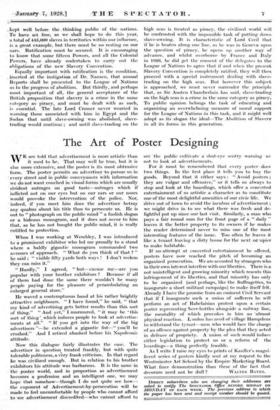The Art of Poster Designing
WE are told that advertisement is more artistic than it used to be. That may well be true, but it is also more extensive, and the poster is its most obtrusive form. The poster permita an advertiser to pursue us in ' every street and in public conveyances with information we do not want couched in visual forms which are usually strident outrages on good taste—outrages which if inflicted not on our eyes but on our ears or our noses would provoke the intervention of the police. Nor, "indeed, if you meet him does the advertiser betray any qualms about his title thus to persecute us. He is out to " photograph on the public mind " a foolish slogan or a hideous monogram, and it does not occur to him that, as he has not bought the public mind, it is really entitled to protection.
When I was working at Wembley, I was introduced to a prominent exhibitor who led me proudly to a stand where a baldly gigantic monogram commanded two avenues of approach. " What do you think of that ? " he said ; " visible fifty yards both ways ! I don't reckon they can miss it."
" Hardly," I agreed, " but—excuse me—are you popular with your brother exhibitors ? Because if all of them had done the same there wouldn't be many people paying for the pleasure of perambulating an enlarged general store."
• He waved a contemptuous hand at his rather brightly attractive neighbours. " I have found," he said, " that my kind of advertising gets better results than this sort of thing." " And yet," I murmured, " it may be ' this sort of thing which induces people to look at advertise- ments at all." " If you get into the way of the big advertisers "—he extended 'a gigantic fist—" you'll. be crushed." And I retired abashed before his Napoleonic attitude. • _ Now this dialogue fairly illustrates the case. The advertiser in question. treated frankly, but with quite tolerable politeness, a very frank criticism. In that regard he was civilized enough. . But in relation to his brother exhibitors his attitude was barbarous. It is the same in the poster world, and in proportion as advertisement becomes a profession and an intelligent one, we may hope that somehow—though I do not quite see how— the exponent of Advertisement-by-persecution will be made to feel uncomfortable by people who cannot afford to see advertisement discredited—who cannot afford to see 'the public cultivate a shut-eye sentry warning us not to look at advertisements.
For it must be remembered that every poster. diaes two things. In the first place it tells you to buy the goods. Beyond that it either says : " Avoid posters ; they are vulgar and offensive," or it tells us always to stop and look at the hoardings, which offer a concerted entertainment of so artistic a character as to constitute one of the most delightful amenities of our civic life. We drive out of town to avoid the incubus of advertisement ; we might drive in to see what there was freih and de- lightful put up since our last visit. Similarly, a man who pays a fair round sum for the front page of a " daily " leaves it the' better property to its owners if he makes the reader determined never' to miss one of the most interesting featUres of the issue. Too often he leaves it like a tenant leaving a dirty house for the next 0C2hpier to make habitable.
. If no attempt at concerted entertainment be offered, posters have now reached the pitch of becoming an Organized persecution. We are accosted by strangers who in their own interest interfere with out liberties. There is a not unintelligent and growing minority which resents this infringentent of its liberties, and that minority has only to be organized (and perhaps, like the Suffragettes, to inaugurate a short militant campaign) to make itself felt.
Already I have the promise from an eminent Civil Servant that if I inaugurate such a union 'of sufferers he will perform an act of Rabelaisian protest upon a certain poster representing beer-bottles alongside a railway line, the mentality of which provokes in him an 'almost physical reaction. Landon has need of village Hampdens to withstand the tyrant—men who would face the charge of an offence against property by the plea that they acted in defence of propriety. A union of such would induce either legislation to protect us or a reform of the hoardings—a thing perfectly feasible.
As I write I raise my eyes to prints of Kauffer's magni- ficent series of posters kindly sent at my request to the Westminster Art School by the Empire Marketing Board. What finer demonstration than these of the fact that decorum need not be dull ? WALTER BAYES.






































 Previous page
Previous page